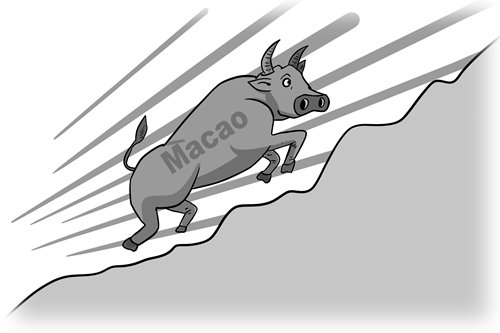HOME >> BUSINESS
Macao has potential, policy advantages to become a regional financial center
By Liang Haiming Source:Global Times Published: 2019/10/23 20:43:41

Illustration: Luo Xuan/GT
Macao has recently taken a series of actions in financial areas. A plan to establish a yuan-denominated securities exchange has reportedly been submitted to the central government. Macao will also be developed into a yuan-clearing center for Portuguese-speaking countries. It will also develop its green financial system, build a cross-country financial service platform between China and Portuguese-speaking countries, promote innovation in the financial sector and develop distinctive financial services. But does Macao intend to become a regional financial center?
Macao has always been dwarfed by Hong Kong, which is an established international financial center. There are disadvantages in Macao: its land area is only about one-fortieth that of Hong Kong, with a population around one-tenth the size of Hong Kong's. Macao is heavily reliant on the gaming industry, which is considered a constraint on industrial diversification. Additionally, local young people seem to be reluctant to engage in high-pay and high-intensity work.
However, these hurdles are not all insurmountable. A 1.3-square-kilometer artificial island has been built near the Macao peninsula. Just 0.5 square kilometers would be enough for a financial development zone. After all, the total commercial and office land in Hong Kong is only 4 square kilometers.
Currently, only current account convertibility for the yuan has been permitted, while foreign exchanges for overseas investment still need approval. As a special administrative region (SAR), Macao's financial market is treated as an offshore market. The SAR's innovative financial practices focus on yuan-denominated business under current accounts. With yuan-denominated derivative products offered by financial institutions, Macao can make itself an interconnected platform with the Chinese mainland and an innovation center for yuan-denominated financial products.
In the markets of certain time-honored international financial centers, investors generally tend to evade high-risk investment portfolios and pursue low-risk, or even risk-free, stable profits. But Macao is a city with a highly developed gaming industry, and investors there usually have a high tolerance for risk.
Meanwhile, compared with cities in the mainland, Macao has a policy advantage when it comes to financial innovation. It will gradually attract more international talent that is less satisfied with merely engaging in traditional financial sectors.
Since the return of Macao to the motherland, the number of international organizations it has joined has roughly doubled to above 100. The number of countries and regions that have agreed to grant visa-free access or visa-on-arrival to Macao SAR passport holders has also increased, from three to 143, lower than Hong Kong's 169. The Macao SAR passport now has a higher value than it did previously. This not only facilitates increased travel for Macao people, but also indicates that the SAR's international status has improved significantly.
Macao's economic performance is outstanding. In 2018, per capita GDP in Macao was $86,400. According to an IMF forecast, the region's per capita GDP will exceed $100,000 by the end of 2020, likely making Macao the world's richest area.
Mainstream Macao society now stands firmly with the central government. Macao's development is closely linked to the development of South China's Guangdong Province, and even to various parts of the mainland. Macao people remain realistic and pragmatic in the pursuit of democracy, freedom and economic development, progressing step by step with patience. A friendly, social atmosphere will help Macao attract global financial elites who are pragmatic and exhausted by political disputes.
Of course, a regional financial center cannot be built overnight. It will take a long time to develop. However, it is undeniable that Macao has the ability and conditions to become a regional financial center, thanks to the advantages of its economy.
The author is the chairman of China's Silk Road iValley Research Institute and the dean of the Belt and Road Institute at Hainan University. bizopinion@globaltimes.com.cn
Posted in: EXPERT ASSESSMENT